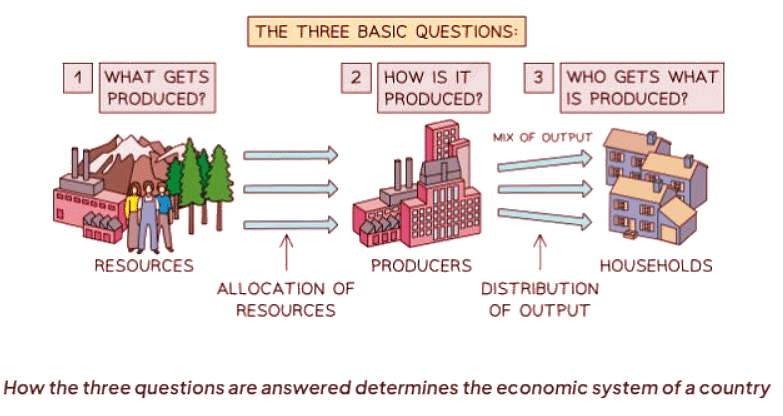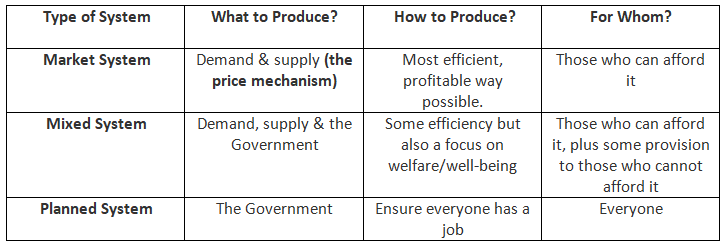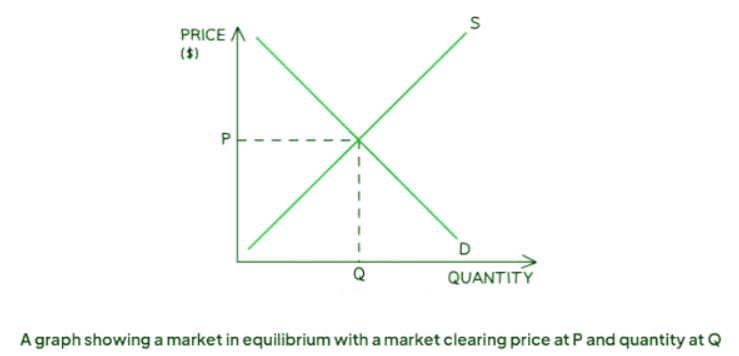Class 10 Exam > Class 10 Notes > Economics for GCSE/IGCSE > The (Free) Market System
The (Free) Market System | Economics for GCSE/IGCSE - Class 10 PDF Download
Different Economic Systems
- Various economic systems are developed or established by different economic entities within the economy to address the fundamental economic issue of scarcity.
- These entities encompass consumers, producers, the government, and specialized interest groups like environmental advocacy organizations or labor unions.
- The primary objective of any economic system is to distribute the limited factors of production effectively.
- The three primary economic systems are a market system (also referred to as a free market system), mixed economy, and planned economy.
What Determines The Economic System Of A Country

Important Economic Questions
- What to produce? This question involves deciding which goods and services to prioritize due to limited resources, considering opportunity costs. For example, should a country invest in better rail services or more public hospitals?
- How to produce it? This question revolves around choosing between labor-intensive methods for higher employment rates or capital-intensive methods for efficiency. For instance, should goods be produced using manual labor or machinery?
- For whom to produce? This question addresses the distribution of goods and services, questioning whether they should be accessible based on affordability or available universally to all members of society.
How These Questions Are Answered Determines the Economic System

How a Market System Works
- A market system functions to efficiently allocate limited resources solely through the dynamics of demand and supply, which is known as the price mechanism.
- In a pure market system, there is no intervention by the government, such as taxation or expenditure.
- However, there are no real-world economies that operate as entirely pure market systems.
- Within a market system, the prices of goods and services are determined by the interplay between demand and supply.
- A market refers to any setting where buyers and sellers come together to exchange goods or services, whether physical (like a McDonald's restaurant) or virtual (such as eBay).
- The price mechanism, driven by the interaction of demand and supply in a free market, dictates prices, which serve as the mechanism for allocating scarce resources among competing needs and desires.
- The price mechanism serves multiple functions within an economy:
- Prices effectively allocate scarce resources, with higher prices indicating increased scarcity. Those who can afford the higher prices obtain the resources, while a surplus leads to lower prices, making them accessible to more consumers.
- Prices convey valuable information to both producers and consumers, signaling where resources are needed (indicated by rising prices) and where they are not (indicated by falling prices).
- When prices of goods or services rise, producers are incentivized to reallocate resources from less profitable markets to capitalize on the higher returns. Conversely, falling prices encourage resource reallocation towards new markets.
Question for The (Free) Market SystemTry yourself: What is the primary objective of any economic system?View Solution
Market Equilibrium & Disequilibrium
- Market equilibrium is reached when the quantity demanded equals the quantity supplied.
- This equilibrium point is where the market clearing price is established.
- The market clearing price is the price at which sellers are able to sell their goods or services at a satisfactory pace.

- Any price deviation from P, either higher or lower, leads to disequilibrium within the market.
- Disequilibrium arises whenever there is either excess demand or excess supply within the market.
The document The (Free) Market System | Economics for GCSE/IGCSE - Class 10 is a part of the Class 10 Course Economics for GCSE/IGCSE.
All you need of Class 10 at this link: Class 10
|
57 videos|110 docs|40 tests
|
FAQs on The (Free) Market System - Economics for GCSE/IGCSE - Class 10
| 1. What are the main characteristics of the Free Market System? |  |
Ans. The main characteristics of the Free Market System include private ownership of resources, minimal government intervention, profit motive, competition, and consumer sovereignty.
| 2. How does a market system determine the prices of goods and services? |  |
Ans. In a market system, prices of goods and services are determined by the forces of supply and demand. When demand exceeds supply, prices tend to rise, and when supply exceeds demand, prices tend to fall.
| 3. What is market equilibrium and how is it achieved in a Free Market System? |  |
Ans. Market equilibrium is the point where the quantity of goods supplied equals the quantity demanded at a specific price. In a Free Market System, market equilibrium is achieved through the interaction of buyers and sellers without any external intervention.
| 4. What role does competition play in a Free Market System? |  |
Ans. Competition in a Free Market System encourages businesses to improve the quality of their products, keep prices low, and innovate to attract customers. It also prevents any single entity from having too much control over the market.
| 5. How do prices act as allocations of scarce resources in a Free Market System? |  |
Ans. Prices in a Free Market System act as signals that indicate the scarcity of resources and help allocate those resources efficiently. When prices rise, it signals scarcity, prompting producers to increase supply or consumers to reduce demand.
Related Searches















